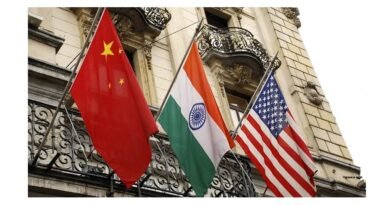The Nagrota link
Connecting the dots between Pakistan and the Nagrota encounter is crucial to deny Islamabad a convenient plank of dismissing it as a local expression of animus
The lacklustre township of Nagrota, just outside the unplanned concrete of Jammu city, was once best-known for housing the largest military corps in the world, White Knights Corps or the XVI Corps, as also for rehabilitating fleeing Kashmiri Pandit migrants from the Valley. The small garrison town snakes around the lifeline of the Jammu-Kashmir highway, which connects the Jammu plains to the Kashmir valley, bisected by the Pir Panjal ranges and the minor Trikuta mountains, which harbour the Vaishno Devi shrine in one of its heights, along with the Nagrota dwelling, in its foothills. Another 54 km down the same road is the Indian Army’s Northern Command headquarters at Udhampur.
The conspicuous presence of the Indian military in this township, barely 40 km from the nearest Pakistan border, as also its service mandate of overseeing operations along the “live”, strategic and frequently contested Line of Control (LoC) with Pakistan, has drawn unwarranted attention of those who seek to create terror and violence, as per the direction of their handlers across the LoC. Four years ago, terror had struck Nagrota as heavily-armed terrorists had sneaked across the border and fired indiscriminately at the sentries guarding the resident 116 Medium Regiment. A hostage-like drama had ensued and by the time the situation was neutralised, seven Indian soldiers and three terrorists were killed. All indications at the Nagrota site had pointed to the role of the terror organisation, Jaish-e-Mohammed, as notes recovered from the slain terrorists pointed to the involvement of the so-called “Afzal Guru Squad.” The said group had earlier carried out similar terror attacks at Pathankot, Baramulla, Uri and so on. Last year this group was responsible for a deadly strike, involving at least 350 kg of explosives at Pulwama, which had killed 40 Indian security personnel – this provocation had led to the reciprocal Balakote airstrike by the Indian Air Force. Last week, Jaish-e-Mohammed resurfaced again when four of its terrorists were killed in a fierce encounter on the Jammu-Srinagar highway, at Nagrota again.
What is significant is the irrefutable Pakistan hand in the latest encounter, as the Bhawalpur-based jihadist group, Jaish-e-Mohammed, owes its genesis and sustenance to the Pakistani establishment or the Inter-Services Intelligence (ISI).
At an oversimplified level, there is also a turf war among the competing insurgent groups in the Kashmir Valley, where the once predominantly local “pro-independence” groups have been marginalised and it is only those with State support from across the LoC for being “pro-Pakistan” (or at an even more extremist level, the pan Islamic Caliphate-seeking groups), who have managed to hold sway. Jaish-e-Mohammed has the notoriety of having Masood Azhar as its ideologue and leader, who has been declared an international terrorist by the United Nations Security Council. He also infamously and incredulously got support from China, which vetoed moves to put him on the UNSC sanctions committee on “technical grounds” and even posited the flimsier excuse of “lack of evidence.” The realpolitik of Pakistan and China in supporting Jaish-e-Mohammed aside, which brooks no morality or consistency in international affairs (hence the perennial struggle for Pakistan in avoiding getting “blacklisted” by the international watchdog agency, FATF, for sponsoring terror), the outfit is banned by UN and almost all Western and even Islamic countries like UAE. Owing to global pressure, Pakistan was forced into the sham of banning the same though the group kept renaming itself as Tehrik-ul-Furqan, then Khuddam ul-Islam, then Al-Rehmat Trust and, so on and so forth. Amid all pressures, Masood Azhar remained loyal to the Pakistan “Deep State” and it paid him back by allowing a free run to his group’s operations and machinations in Kashmir. Temporary “protective custody” enforced on Azhar from time-to-time has impressed no one, and his ability to sustain his operational capabilities in Jammu & Kashmir points to the continued handiwork of the Pakistani establishment, solely and wholly.
The latest Nagrota incident reeks of the scale, sophistication and brazenness of Pakistani complicity. The sheer cache of arms from the terrorists (11 AK-47, three pistols, 29 grenades, six UBGLs, mobile devices and so on) and the subsequent unearthing of a 150-metre long tunnel in the nearby Samba area for the facilitation of the cross-border movement, is impossible without State support. The construction of this tunnel has all the hallmarks of engineering complexities (at least 25-30 metres deep and almost 2.5 metress wide) and facilitation, which could not have been arranged without the acquiescence and material support from the nearby Pakistani posts of Rajab Sahid and Asif Sahib. The presence of the protective Sarkanada (elephant grass) on the Pakistani side of the tunnel to hide the literal spade work is self-explanatory. To suggest ignorance or naivete in overlooking the efforts and time to construct such a sized tunnel and arrange for the disposal of the dug-out soil without its discovery by the Pakistani patrol and posts, is unthinkable. Rightfully, an indignant New Delhi summoned the Pakistan charge d’affaires with incriminating evidence towards a “major attack to destabilise the peace and security.” This was expectedly denied by the Pakistani Foreign Office, as it has done for decades even though it has earned international ignominy as the “nursery” for global terror.
Importantly, India has dialled up the charges against Pakistan, with the Prime Minister himself tweeting about the incident. This escalation is timely as neighbouring Afghanistan is imploding with terror unleashed by the Pakistan-supported Taliban and the situation is expected to worsen. Pakistan should be disallowed the window of transition between the changing US administrations to further its nefarious designs, especially as Donald Trump has given it the long rope in order to fulfil his personal commitment of troops withdrawal from Afghanistan. Nailing Pakistan and “naming and shaming” is the key to ensure that the global pressure does not wane. Connecting the dots between Jaish-e-Mohammed and the Nagrota encounter is crucial to deny Islamabad the convenient postulation of Nagrota as a local expression of animus. Pakistan has been and continues to be the singular source of armed terror in Kashmir – Nagrota has proved this yet again.
(The writer, a military veter-an, is a former Lt Governor of Andaman & Nicobar Islands)
Source: The Pioneer




